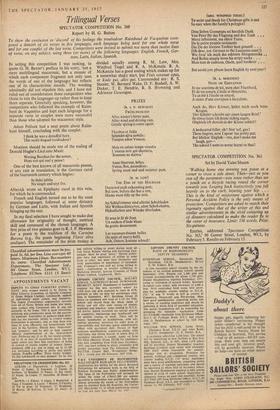Trilingual Verses
SPECTATOR COMPETITION No. 360 Report by H. G. Button
To show the confusion or 'discord' of his feelings the troubadour Raimbaud de Vacqueiras com- posed a descort of six verses in five languages, each language being used for one whole verse and for one couplet of the last verse. Competitors were invited to submit not more than twelve lines of verse, on any subject, using three (or )Wore) of the following languages: English, French, Ger-
man, Latin, Italian, Spanish.
IN setting this competition I was seeking, to quote G. H. Baxter's preface to his entry, `not a mere multilingual macaronic, but a mosaic of which each component fragment not only uses the words of one of, the languages but reflects one of its characteristic moods.' The wording admittedly did not stipulate this, and I have not ruled out of consideration those competitors who chose to mix the languages up rather than to keep them separate. Generally speaking, however, the competitors who followed the example of Raim- baut de Vaqueiras and kept each language for a separate verse or couplet were more successful than those who adopted the macaronic style.
Adam Pollock had a neat poem about Ratm- baut himself, concluding with the couplet:
I think he was a dreadful bore This multi-lingual troubadour!
Mention should be made too of the ending of Donald Hughe's Lied sans Music
Wooing Bacchus for the nonce. Honi soit qui mal y pense !
One of the best known of all macaronic poems, at any rate in translation, is the German carol of the fourteenth century which begins : In dulci jubilo Nu singet und scyt fro.
Alberick wrote an Epiphany carol in this vein, for which he is commended.
French and English turned out to be the most popular languages, followed at some distance by German and Latin, with Italian and Spanish bringing up the rear.
In my final selection I have sought to make due allowance for originality of thought, metrical skill and command of the chosen languages. A first prize of two guineas goes to R. J. P. Hewison for a poem in the tradition of the Carmina Burana (e.g., the poem beginning Floret silva undique). The remainder of the prize money is divided equally among R. M. Low, Mrs. Winifred Tiegel and R. A. McKenzie. R. A. McKenzie has a good ending which makes up for a somewhat shaky start, but Finis coronat opus, or Ende gut, alles gut. Commended are : R. S. Stanier, W. Bernard Wake, D. F. Bushell, A. W. Dicker, T. E. Hendrie, R. B. Browning and Adrienne Gascoigne.
PRIZES (a. 3. P. HEWISON) FROHLINGSLIED
After winter's bitter pain, After wind and driving rain, Gentle spring is come again.
Floribus et foliis Splendet silva nobilis : Tempos adest Veneris.
Mais en meme temps viendra Voiseau noir qui chantcra, 'Jeunesse ne durera.'
Ainsi faneront, Was, Venus, fins, jucunditas :
Spring must end and summer pass.
(a. M. Low) THE END OF THE HOLIDAYS
Departed each exhausting pest; But now, before she has a rest, Mama must tidy up the nest.
Im Schlafzimmer sind allerlei Schubladen Mit Weihnachtskarten, alten Schokoladen, Plakatfarben und Witschc ilberladen.
Et sous le lit de Jean Un cochon d'Inde blanc Se gratte doucement.
Les vacances etaient belles (In spite of merry hell).
Ach, Ostern, komme schnell I
(MRS. WINIFRED TIEGEL) To write and thank for Christmas gifts is not So easy when the family's polyglot!
Dem lieben Grosspapa sei herzlich Dank Von Peter Ilk das Flagzeug und den Tank Merci infiniment, ma there Tante, De la petite poupde ravissante Die Du der kleinen Tochter hut gesandt . . . (Oh dear, not German to the Lausanne aunt!) Wie fret? ich mich des schilnen Morgenrocks. And Robin simply loves his stripy socks . . . Mais tent de cadeaux, Oncle, quel bonheur . .
But could you please learn English by next year?
(R. A. MCKENZIE)
Nom ON EDUCATION
Je me souviens de toi, mon cher Flambard, Et de tes soeurs, Cecile et Henrictte; Tu as Ete a l'ecole en retard, A cause d'une crevaison i3 bicyclette.
Auch du, Herr Korner, haltst mich noch beim Kragen.
`Der Schiller schreibt mir cinen langcn Brief.' So etwas kann ich heute richtig sagen, Obgleich ich damals in der Klasse schlief I A heducated feller, eh? Not 'arf, guy! Them lingoes, now I spout 'em pretty pat; But blinkin' English—'ere, don't make me
laugh, guy—
The school I went to never learnt us that!
• • •


































 Previous page
Previous page